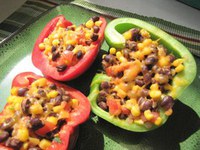Prairie Fare: I’m Spillin’ the Beans
(Click an image below to view a high-resolution image that can be downloaded)
By Julie Garden-Robinson, Food and Nutrition Specialist
NDSU Extension
Have you ever been to a food festival?
Every state has at least one food festival, and they often showcase the foods grown or caught in the region. Sometimes festivals also highlight the ethnic heritage of people in the area. Supporting your community and everything that makes it unique is a memorable way to connect.
For example, if I were in Georgia in June, I’d love to check out the Peach Festival. I like lobster, so being in Maine in early August for the Lobster Festival would be a treat. Alaska has a crab festival, and the pickle festival in Alabama sounds quite interesting.
I have been to a few festivals. I have souvenirs from the garlic festival in Gilroy, Calif. You can smell the aroma of that festival for miles. I have a cup from Taste of Chicago, where I tried a lot of Chicago-style pizza options.
We have many festivals in the Midwest, too. In Minnesota, you can check out Potato Days in Barnesville in August. I need my annual dose of Scandinavian potato dumplings, so I never miss that one. I‘d like to attend the Wild Rice festival in Minnesota some time, too.
Fargo has a Rib Fest, and I have stuffed myself at it. The Norsk Hostfest in Minot is the largest Scandinavian festival in North America, and you can experience a wide range of music, arts, activities for kids and lots of food options, of course.
Some festivals are very elaborate with parades, kids events, beauty pageants, car shows, craft fairs and contests, such as lefse-making contests or even potato wrestling. (For my readers outside of the area, lefse is similar to a very tender tortilla made from potatoes. I have not participated in potato wrestling, by the way.)
I recently attended Bean Days in Horace, N.D. I knew someone who marched in the parade with her granddaughters and their donkeys. The event had craft and food vendors, a car show and a bean bag toss.
Because beans are on my mind, this week we will celebrate the bean and learn a little more about these nutrient-rich foods, which we grow in abundance in North Dakota, Minnesota and other states in the area. In fact, in 2017, North Dakota ranked first in the U.S. in the production of navy and pinto beans and ranked second in the production of black and Great Northern beans.
Dry edible beans are part of the legume family. A legume plant produces seeds in a pod; dry beans are the mature seeds within these pods. Other members of the legume family include lentils, peas, chickpeas, peanuts and soybeans.
You probably have gathered that dry edible beans are good for you. In fact, eating more beans may reduce the risk of certain types of cancer, including colon, kidney, breast and prostate cancers. Much of the health benefits are linked to their fiber and natural antioxidant content.
Colorful beans such as red kidney beans and black beans have more antioxidant activity than white beans, but all types of beans have health benefits.
Beans may be beneficial for your waistline and your heart, too. Researchers reported that people who consumed beans regularly had a lower body weight, lower waist circumference and lower systolic blood pressure, in addition to a greater intake of dietary fiber, potassium, magnesium, iron and copper.
Beans are gluten-free naturally, so they provide healthful options for those who need to avoid gluten protein for medical reasons. People following vegetarian or vegan eating patterns consume beans for their protein, vitamin and mineral content. Beans are a meat alternative and contain the full complement of amino acids when paired with grains.
We are so intrigued with beans in NDSU Extension that we compiled a “Spillin’ the Beans” cookbook. It’s posted online at https://tinyurl.com/NDSU-Spillin-the-Beans and includes numerous recipes for salads, main dishes, soups and desserts.
Have you ever tried black bean brownies? The not-so-secret ingredient (beans) adds fiber and nutrition, and you’ll find the recipe in the cookbook.
You might have a bumper crop of bell peppers in your own garden or from farmers markets. This recipe features black beans and vitamin C-rich peppers. If you are looking for another festival, check out the North Carolina Pepper Festival some time.
Stuffed Peppers
4 medium bell peppers, any color
1/2 medium onion, chopped
2 c. corn (fresh or frozen)
2 small tomatoes, chopped
2 (15 1/2-oz.) cans black beans, drained and rinsed
2 tsp. olive oil
1 tsp. cumin
1/2 tsp. cayenne pepper
1 garlic clove, minced
2 tsp. cilantro, finely chopped
1 c. shredded reduced-fat cheddar cheese (try pepper jack for more spice)
Rinse peppers and cut in half lengthwise; remove seeds. Place peppers in a large pot and cover with water. Bring to a boil, reduce the heat, cover and simmer for five minutes; drain. Set pepper halves on greased baking sheet. Preheat oven to 350 F. In a small skillet, saute the chopped onion in olive oil until tender.
Mix together onions, tomatoes, corn and black beans in a medium-sized bowl. In a small bowl, combine oil and seasonings; add to vegetable mixture and mix thoroughly. Fill pepper halves with mixture and top with cheese. Bake for eight to 10 minutes or until cheese is melted.
Makes eight servings. Each serving has 130 calories, 2 grams (g) fat, 7 g protein, 26 g carbohydrate, 7 g fiber and 240 milligrams sodium.
(Julie Garden-Robinson, Ph.D., R.D., L.R.D., is a North Dakota State University Extension food and nutrition specialist and professor in the Department of Health, Nutrition and Exercise Sciences. Follow her on Twitter @jgardenrobinson)
NDSU Agriculture Communication - Sept. 20, 2018
| Source: | Julie Garden-Robinson, 701-231-7187, julie.garden-robinson@ndsu.edu |
|---|---|
| Editor: | Ellen Crawford, 701-231-5391, ellen.crawford@ndsu.edu |



